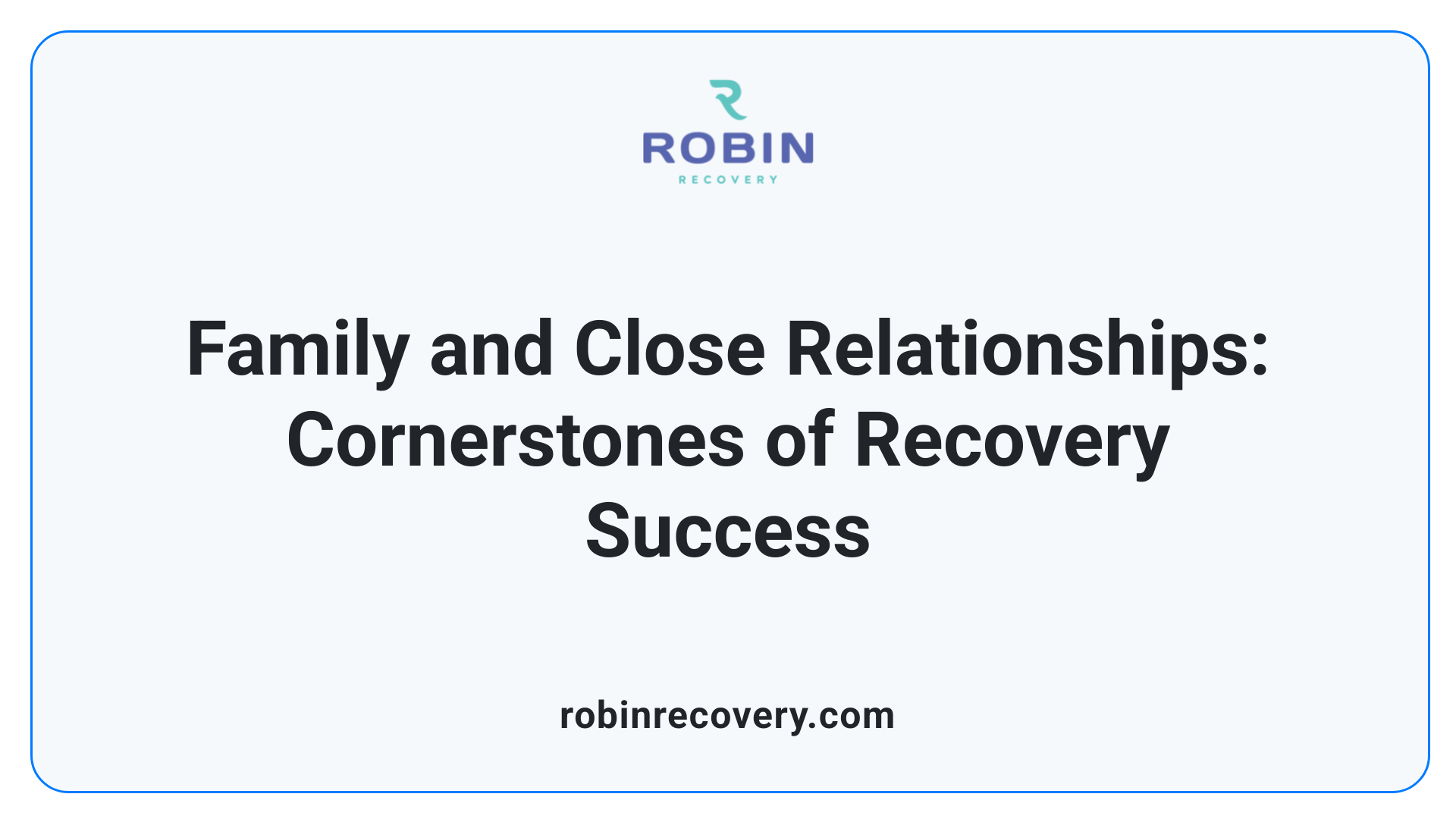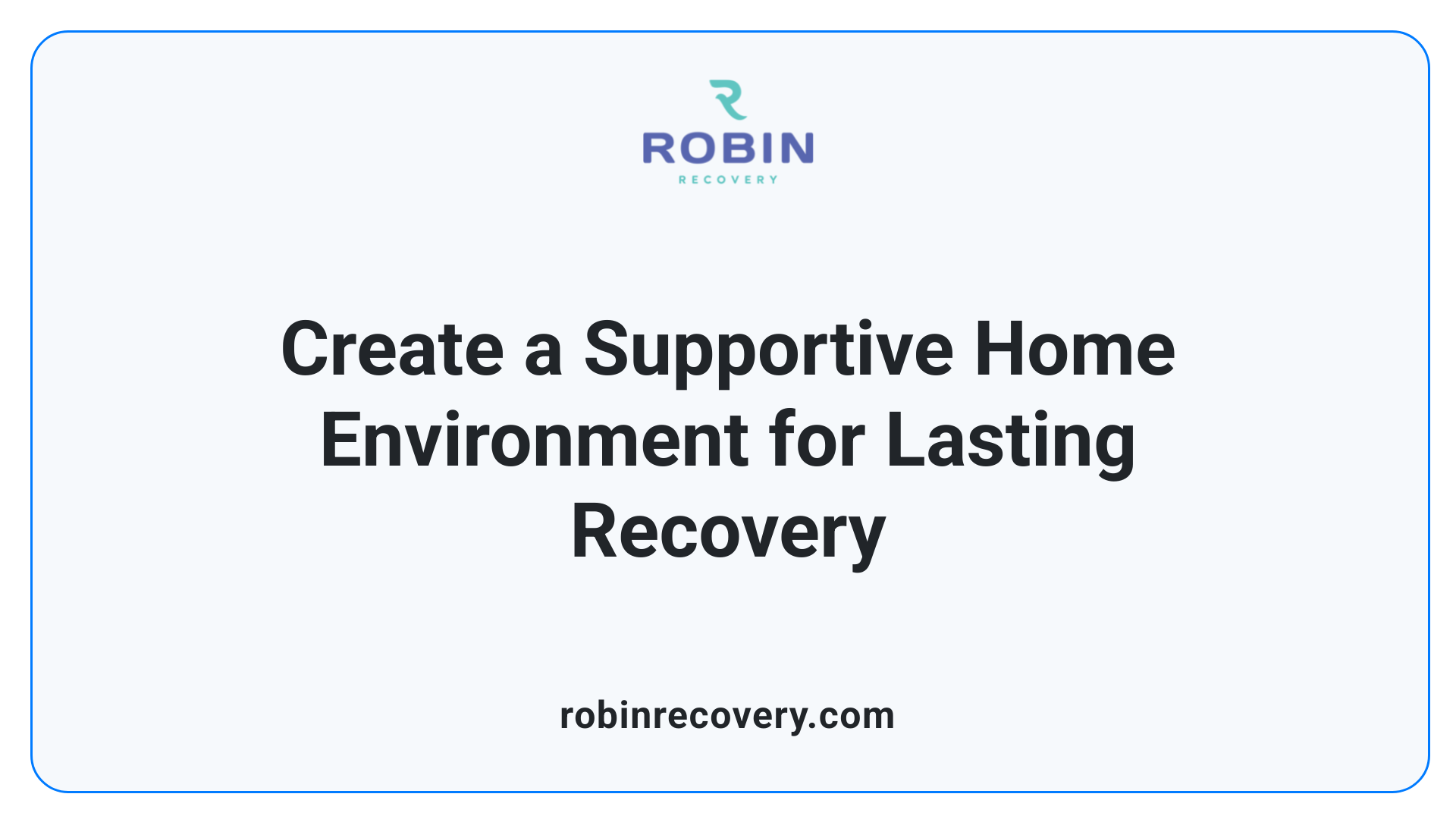How to Create a Family Support Network for Long-Term Recovery

The Foundation of Long-Term Recovery
Creating a robust family support network is essential for individuals embarking on or maintaining long-term recovery from addiction. Such networks provide emotional stability, practical assistance, and accountability, which are vital in combating the challenges of sobriety. This article explores the strategic steps, resources, and best practices for establishing and nurturing a family-centered support system that fosters resilience and sustainable recovery.
Understanding the Significance of Social Support in Recovery

Why is social support important in recovery?
Building and maintaining a strong support network is essential for long-term success in addiction recovery. Support systems such as family, friends, peer groups, and professionals provide crucial emotional, practical, and motivational help.
Emotional support helps individuals feel valued and understood, combating feelings of loneliness, hopelessness, and depression that often accompany recovery. Practical support includes assistance with daily responsibilities or navigating challenges that arise during sobriety, such as managing stress or cravings.
Motivational support and accountability from trusted individuals encourage continued effort and resilience in facing setbacks. Participation in support groups like Alcoholics Anonymous (AA) or Narcotics Anonymous (NA), as well as engaging with mental health professionals, strengthens social bonds and reinforces commitment to sobriety.
Research indicates that individuals with robust social networks are more likely to complete treatment, maintain sobriety, and experience improvements in mental health. These connections foster a sense of belonging and purpose, essential for overcoming the psychological toll of addiction.
Overall, social support reduces feelings of isolation, provides continuous encouragement, and offers vital resources that help individuals navigate the complex journey of recovery, significantly lowering the risk of relapse.
The Critical Role of Family and Close Relationships

What role do family and close relationships play in recovery?
Family and close relationships are fundamental to the recovery process from addiction. They provide vital emotional support, encouragement, and a sense of stability that are essential during challenging times. Having supportive loved ones can motivate individuals to stay committed to their sobriety and adhere to treatment plans.
These relationships also foster a nurturing environment where trust and open communication are encouraged. When family members understand the nature of addiction and support their loved ones without judgment, it creates a positive space for healing and growth. Additionally, families can help set healthy boundaries and develop routines that promote responsibility, reducing triggers and stressors that might lead to relapse.
Participation in family therapy sessions and support groups plays a significant role in strengthening these bonds. Such involvement helps repair damaged relationships, rebuild trust, and address underlying issues. Support groups like Al-Anon or Nar-Anon offer families a community of others navigating similar experiences, providing shared understanding and coping strategies.
How families can support emotional well-being
Family members can support emotional health by maintaining open lines of communication. Active listening, empathic understanding, and expressing appreciation help in reducing feelings of loneliness and hopelessness.
Educating themselves about addiction as a disease reduces stigma and fosters a more compassionate environment. This understanding improves patience and encourages supportive interactions that motivate recovery.
Reinforcing healthy lifestyle choices—such as stress management techniques, engaging in shared activities, and encouraging participation in sober social circles—is also beneficial.
Participation in family therapy and support groups
Family therapy addresses underlying emotional and relational issues that may contribute to substance use. It helps families develop healthier dynamics, improve communication skills, and rebuild trust.
Support groups like Al-Anon connect family members with others who are in similar situations, offering shared experiences, emotional support, and practical advice. These groups validate feelings and empower families to support their loved ones effectively.
Involving family in treatment and recovery planning leads to better outcomes, increases motivation, and provides ongoing encouragement.
Overall, the influence of family and close relationships in recovery is profound. They offer emotional stability, practical assistance, and motivation, shaping a supportive environment that is conducive to lasting sobriety and mental health.
Building a Supportive Environment at Home

What resources and tips are available for fostering a supportive recovery environment?
Creating a home environment that supports recovery involves a combination of practical resources and thoughtful strategies. Community support groups such as Alcoholics Anonymous (AA), Narcotics Anonymous (NA), and local counseling services offer ongoing emotional and peer support. Sober living facilities can provide a structured, substance-free space that encourages accountability and community.
Educational materials about addiction and recovery help increase understanding and reduce stigma within the household. These resources can include books, online courses, or therapy workbooks that foster awareness and empathy.
When setting up a supportive home, open and honest communication is essential. Family members should strive to foster a non-judgmental atmosphere where feelings and concerns can be shared freely. Respecting the recovering individual’s autonomy and establishing clear boundaries are also critical to maintaining safety.
Building a strong support network extends beyond just family — healthcare professionals, peer groups, and community organizations all play vital roles. For example, involving a therapist or counselor can provide personalized guidance.
Physical aspects of the home can influence mental well-being. Thoughtful design elements such as calming decor, aromatherapy, or personal mementos can create a nurturing environment. Encouraging outdoor activities like gardening, walking, or sports additionally supports emotional health.
Creating an atmosphere of social acceptance and ongoing education about addiction reduces stigma and empowers the individual. Promoting emotional literacy helps family members better understand and manage their own feelings, leading to more constructive interactions.
In summary, fostering a recovery-friendly environment requires a comprehensive approach that blends available resources with compassionate communication and healthy routines. This kind of environment nurtures resilience and supports sustained sobriety.
Strategies and Best Practices for Establishing a Support System

What are effective strategies for establishing a support system?
Building a solid support network is crucial for long-term recovery from addiction. One effective approach is to identify and connect with trustworthy individuals, such as supportive friends and family members who understand and respect your recovery journey. These relationships should be nurtured through honest communication, active listening, and expressing appreciation.
Joining structured recovery support groups like Alcoholics Anonymous (AA), Narcotics Anonymous (NA), or SMART Recovery provides a judgment-free space to share experiences, gain encouragement, and develop connections with peers who face similar challenges. Both in-person and online support communities can offer valuable emotional backing and practical advice, making sure help is accessible whenever needed.
Rebuilding or strengthening relationships damaged by addiction requires patience, honesty, and effort. Making sincere amends, establishing healthy boundaries, and practicing open communication help restore trust and foster a supportive environment.
Seeking professional guidance is also a key component of a strong support system. Therapists, counselors, and treatment programs can provide personalized strategies, emotional stability, and ongoing encouragement to navigate complex recovery challenges.
Maintaining contact regularly, participating in community activities, and practicing gratitude by helping others reinforce bonds and expand your support base. These efforts not only create resilience against relapse but also cultivate a sense of belonging and purpose.
In summary, establishing a support system involves reaching out to trusted individuals, engaging in recovery communities, restoring relationships with patience and honesty, and seeking expert advice. These practices collectively foster a supportive environment essential for successful, long-lasting sobriety.
Creating a Personal Recovery Support Plan
What are the key steps to creating a personal recovery support system?
Building an effective support system is a vital part of sustaining long-term sobriety. The process starts with identifying trustworthy individuals who can provide emotional encouragement and practical assistance. This includes family members, friends, and peers who are supportive, honest, and understanding of the recovery journey.
Engaging with professional support is equally important. Therapists, counselors, and healthcare providers offer personalized guidance, help address emotional and psychological challenges, and assist in developing coping strategies. Regular sessions and check-ins ensure that recovery remains focused and adaptive to changing needs.
Participation in community and online support groups greatly enhances the support network. Groups like Alcoholics Anonymous (AA), Narcotics Anonymous (NA), or online forums provide a judgment-free environment where individuals can share experiences, gain motivation, and learn relapse prevention tools. These groups also foster connections with others facing similar challenges, reinforcing that recovery is a shared journey.
Setting healthy boundaries and establishing routines are crucial for maintaining stability. Clear boundaries with family and friends prevent enabling behaviors and create space for personal growth. Developing daily routines around work, hobbies, exercise, and self-care helps reduce stress, increase focus, and promote a sense of purpose.
Overall, creating a support system involves continuous effort—reaching out, participating in groups, and nurturing relationships. Expanding this network over time while maintaining healthy boundaries ensures resilience. This approach not only reduces the risk of relapse but also builds a foundation for emotional well-being and lifelong recovery.
Maintaining and Developing Long-Term Support Relationships
How can individuals build a support network for long-term recovery?
Building a strong and lasting support network is a vital step in maintaining sobriety and preventing relapse. The process begins with identifying trusted friends, family members, and peers within recovery communities who are supportive and understanding of your journey. Active outreach to these individuals creates a foundation of mutual trust and respect.
Participating in support groups such as Alcoholics Anonymous (AA), Narcotics Anonymous (NA), or other structured programs like SMART Recovery provides shared experiences, advice, and mentorship opportunities. These groups offer a judgment-free space to share struggles and successes, which helps sustain motivation and resilience.
Engaging with mental health professionals through therapy or counseling adds an essential layer of emotional support. Professionals can assist in developing personalized coping strategies, addressing underlying issues, and providing confidentiality. Many online communities and forums also offer additional avenues for connection, especially during times of crisis or after-hours.
Building healthy, boundaries-enforced relationships helps protect against triggers and temptations. Honest communication with loved ones and peers fosters understanding and accountability. Celebrating milestones and progress, along with giving back—such as helping others in recovery—will reinforce these relationships, creating a supportive, reciprocal environment.
Maintaining this network involves ongoing effort—regular contact, participation in activities, and continuous self-awareness. Involving oneself in hobbies, volunteer work, or community events can also expand the network, introduce positivity, and reinforce commitments to sober living. Overall, a robust support structure combines community engagement, professional guidance, and meaningful relationships, forming a safety net that sustains long-term recovery.
Supporting Continuous Growth and Resilience in Recovery

How can I develop and maintain support relationships during long-term recovery?
Building and nurturing ongoing support relationships is a vital part of sustaining long-term sobriety. It starts with developing a diverse network that includes trusted family members, friends, peers in support groups like Alcoholics Anonymous (AA), Narcotics Anonymous (NA), and online recovery communities.
Consistency in communication and mutual trust are essential. Regularly checking in with loved ones, sharing progress, and being honest about challenges help solidify these bonds. Engaging in community activities such as volunteering, attending workshops, or participating in alumni group events can also foster new supportive relationships and strengthen existing ones.
Maintaining a connection with therapists, counselors, or faith-based groups adds ongoing guidance and inspiration. These relationships not only provide practical support but also emotional stability, helping to reinforce motivation and resilience.
Fostering a positive environment based on understanding, respect, and shared recovery goals encourages a sense of belonging and accountability.
In summary, ongoing involvement in various supportive environments—personal, community, and professional—creates a robust foundation for resilience. This support network nurtures emotional well-being, reduces the risk of relapse, and promotes a healthy, fulfilling life in recovery.
Empowering Your Support System
Building and maintaining a strong family support network is an ongoing process that requires patience, commitment, and mutual respect. By actively engaging with loved ones, participating in support groups, and seeking professional guidance, individuals can create a resilient environment that fosters long-term sobriety. Remember, recovery is not a solitary journey but a collective effort rooted in understanding, compassion, and shared goals. With a well-established support system, recovery becomes not just about avoiding substances, but about cultivating a fulfilling, balanced, and healthy life.
References
- Building a support network: Friends & family in recovery | Delamere
- How to Build a Support Network in Recovery
- Building a Sober Support Network for Long-Term Recovery
- Building a Healthy Support System in Recovery - Addictions
- The Power of Strong Family Support for Successful Long-Term ...
- Best Family Support Techniques for Recovery - RECO Intensive
- How to Create a Supportive Network for Recovery
